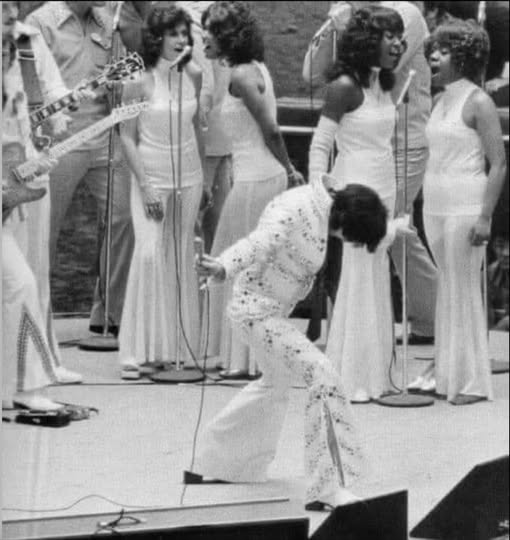Elvis Presley remains one of the most celebrated voices in music history, renowned not only for his incredible vocal talent and electrifying performances but also for his genuine humanitarian spirit and steadfast commitment to equality.

In an era when music had the power to unite and overcome social divisions, Elvis used his influence to challenge prevailing norms and become a true advocate for racial reconciliation.
A little-known incident in 1970 would illustrate this aspect of his character and change everything for the singers who performed with him, forever impacting their lives. That year, Elvis was scheduled to perform at the Houston Astrodome, an enormous multi-purpose arena opened in 1965 that hosted a variety of events.
This concert was especially significant because it marked the first time he performed outside of Las Vegas, a decision made by his enigmatic manager, Colonel Parker. Simultaneously, the Astrodome served as the debut venue for The Sweet Inspirations, a groundbreaking African-American female vocal group celebrated for their soulful harmonies and dynamic stage presence. In 1969, The Sweet Inspirations were offered an extraordinary opportunity to tour with Elvis Presley.
Initially skeptical, group member Myrna Smith recalled exclaiming, “Elvis Presley! What does he want us for?” as they wondered if their rhythm and blues style would blend with the sound of the Mississippi-born icon, whose appeal was traditionally centered on a predominantly white audience.
However, any concerns vanished during their first meeting in Las Vegas when Elvis, dressed in a stunning chocolate-colored suit with a perfect tan, greeted them warmly with a simple “Hi, I’m Elvis Presley,” and his genuine warmth was immediately evident. From that first meeting, the chemistry between him and The Sweet Inspirations was undeniable, and Sylvia Shemwell later commented that she had never had another doubt, noting that Elvis was a wonderful person who truly did not care about the color of anyone’s skin.
Despite their initial excitement, controversy soon arose during Elvis’s Texas debut at the Astrodome when rumors spread that he had been advised to leave his African-American backing group behind.
One account claimed that someone had suggested, “You can leave the black girls at home; you don’t have to bring them,” a remark that fueled unfounded allegations of racism and contributed to persistent myths about the King’s attitudes. In reality, Elvis actively pursued racial reconciliation by choosing to work with and celebrate musicians from diverse backgrounds.
When officials associated with the Houston Livestock Show and Rodeo requested that he exclude his African-American female backing group due to racial biases, Elvis responded decisively by declaring, “Well if they don’t come, I don’t come.” Myrna Smith later recalled that upon arrival, the group was greeted by a young blonde in a convertible—Elvis’s daughter—who was assigned to drive them around, a subtle yet powerful gesture affirming that he would ensure they were treated with the respect they deserved. This pivotal moment not only reinforced Elvis’s legacy as a musical icon but also established him as a compassionate ally in the fight against racism. During the concert, The Sweet Inspirations were overwhelmed by the warm reception they received from the audience, and it was only years later that they fully understood the depth of his support. After the final show, Elvis held a press conference at Astroworld for about one hundred journalists, expressing his exhilaration at having performed in the Astrodome.
When he departed, he did so in unforgettable style—wearing a blue, Easy Rider-inspired suede jacket paired with black trousers, carrying twenty suitcases and three guitars, and leaving $1.2 million richer than he had been just three days earlier. This extraordinary event encapsulates not only the musical genius of Elvis Presley but also his profound humanitarian values, proving that for him, his backup singers were not merely performers on stage but were truly family. The legacy of that little-known moment continues to inspire, reminding us that true greatness lies in standing up against injustice and celebrating the talent of all people. This story is a testament to Elvis’s enduring impact on music and society, and it remains a shining example of how one man’s courage and compassion can change everything. His legacy lives on in every note sung, every barrier broken, and every heart inspired by his example for eternity.





